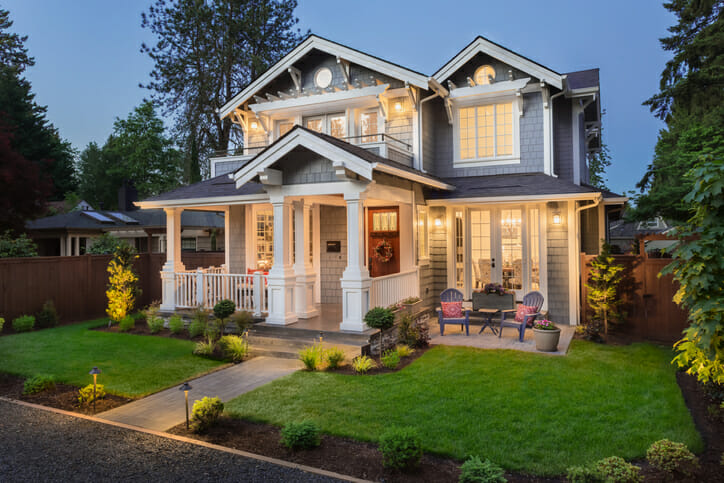Persistent inflation and rising mortgage rates are slowing down home sales. But a new study from the real estate website Zillow says that the housing market in cities could be better than in suburbs for the first time since the Great Recession of 2008. Let’s take a look at how inflation and mortgage rates are affecting the housing market, where suburb home prices are outpacing cities and the reasons you may (or may not) want to buy a home if the economy goes into a recession.
If you’re looking to buy a home in a downturn economy, a financial advisor could help you put a financial plan together for your needs and goals.
How Inflation and Mortgage Rates Are Affecting Housing
First, let’s break the bad news: mortgage company Fannie Mae says an economic downturn is inevitable.
The government-sponsored enterprise reported in a May 19 statement that persistent inflation, combined with rising interest rates and a slowdown of global economic growth, will likely tip the U.S. economy into a modest recession by 2023.
This forecast expects home sales to slow down in the second and third quarters of 2022. And the mortgage company explained that rising mortgage rates, which are now at the highest level since the Great Recession (2008-2009), could have a domino effect – softening construction activity and ultimately decelerating historically high housing prices.
“Financial conditions have tightened significantly, and the economy is slowing faster than previously expected as markets adjust to the Federal Reserve’s tightening guidance,” said Doug Duncan, senior vice president and chief economist at Fannie Mae, in the statement.
While household spending and business fixed investment remained strong during the first quarter of 2022, the U.S. Bureau of Labor Statistics reported that the inflation rate was 8.3% in April 2022. This was 0.3% lower than in March, when it reached a 40-year high since the Reagan recession in 1981. And consequently, the Federal Open Market Committee (FOMC), which determines monetary policy, raised interest rates aggressively by 50 basis points in May, setting the new target range between 75 and 100 basis points.
Mortgage experts say that when rates go up, the cost of lending also shoots up, and this eats away at the bottom line of both homeowners and borrowers. Historically, Fannie Mae explains, rising mortgage rates have slowed down home sales, which could contribute to an economic recession.
“Rising mortgage rates are reducing affordability through higher mortgage-related costs, all while house prices continue to grow,” Duncan said in the statement. “Not only is the worsening affordability of homes a problem for potential entry-level homebuyers, but current homeowners are less likely to trade in their existing lower-rate mortgages and list their homes for sale, both of which will likely weigh on sales.”
Home Buying in Cities Could Be Easier Than Suburbs

Now, here’s some good news: Zillow says that homebuyers may have an easier time buying a home in a city than a nearby suburb for the first time since the Great Recession.
In a study from May 2022, the real estate website reported that home values are growing most in suburbs.
Zillow found that with remote work becoming a popular option for more households during the coronavirus pandemic, homebuyers have been prioritizing affordability and space over proximity to the workplace.
This has driven the home value of a typical suburban home up by $66,490 in the year ending March 2022, while the typical urban home gained $61,671 in the same period.
Homebuyers, however, should note that urban homes are still worth more than suburban homes.
In March 2022, Zillow says that the typical value of a home in an urban area was $370,336 across the U.S., which is $12,340 more than the typical suburban home ($357,996). But as the price of suburban homes outpaces cities, demand could shift back to urban homes with affordability decreasing in the suburbs.
Data shows that in a housing market like New York, the typical value of an urban home ($688,835) was almost $145,000 more than a suburban home ($544,108). But the price of a suburban home ($65,936) grew faster than an urban home ($55,526) by more than $10,400 in just one year.
As another example, urban homes ($920,417) in Seattle, Washington are worth almost $217,000 more than suburban homes ($703,419). But the price of suburban homes ($146,815) grew roughly $27,000 more in 12 months when compared with urban homes ($119,725).
Should You Buy a Home in a Recession?
Depending on how a recession affects real estate markets and interest rates, taking out a mortgage could be risky. However, a recession could also present an opportunity for you to seize upon a dream home.
Financial experts say that interest rates can fall in a recession as demand for loans declines and investors prioritize safety. This could happen if rising mortgage rates drive enough homebuyers out of the market and home prices decelerate.
“With mortgage rates having risen faster in the last 5 months than in any period since 1981, the ESR Group expects both purchase and refinance originations to decline meaningfully,” Fannie Mae said in the May statement. “With only 1.4 percent of mortgages now predicted to have a 50-plus-basis point incentive to refinance, it’s expected that, going forward, a majority share of refinance activity will be of the cash-out variety.”
Lower interest rates and lower housing prices could flip a seller’s market into a buyer’s market. From a real estate perspective, a buyer’s market happens when the number of homes in the market outnumber the buyers. And as supply exceeds demand, more homes could get listed at bargain prices.
A recession could also drive homeowners to do a short sale, which happens when they sell their homes for less than what is owed on their mortgages. But while this can seem like a great deal for homebuyers, the process might take months and the bank could ultimately reject the short sale because the price is too low.
Factors to look out for in a buyer’s market include a higher inventory of comparable homes in a neighborhood and lower consumer confidence, which could translate into less competition.
Even when tough economic conditions are persistent, if you have a steady income and could secure a good mortgage interest rate, the benefits of buying a home could outweigh the risks.
However, a recession could make credit scores more stringent for mortgage borrowers. And you may be competing with investors who are also seizing upon bargain deals to buy up properties for rentals.
Independently from the circumstances, you can mitigate risk by paying down debt before buying a home and increasing your down payment to lessen the financial burden of a mortgage.
Bottom Line

When mortgage rates go up, so could the cost of lending, and this can eat away at the bottom line of both homeowners and borrowers. Though buying a home during an economic downturn can be risky, different economic factors can also line up to create unexpected opportunities. Homebuyers can mitigate risk by paying off debt and taking steps to making their mortgage sustainable.
Tips for Buying a Home
- Whether you are shopping in a seller’s market or a buyer’s market, a financial advisor could help you create a financial plan for your home buying needs. Finding a financial advisor doesn’t have to be hard. SmartAsset’s free tool matches you with up to three financial advisors who serve your area, and you can interview your advisor matches at no cost to decide which one is right for you. If you’re ready to find an advisor who can help you achieve your financial goals, get started now.
- When competing in a seller’s market, homebuyers may want to get an edge by securing a mortgage pre-approval.
- If you are buying a home when mortgage rates are going up, you may want to buy mortgage points upfront to lower the interest rate on your loan.
Photo credit: ©iStock.com/SvetlanaSF, ©iStock.com/SolisImages, ©iStock.com/hikesterson
